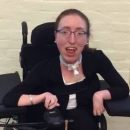- A
- A
- A

Through my networks and personal experiences, I have seen firsthand the trials, tribulations, and triumphs the disability community experienced during 2017. The events of the last year have transformed me from a casual bystander to an avid follower and participant in politics, especially regarding disability issues. Last week I watched the State of the Union Address uncertain how our current president would portray the events of this past year and what he would say about disabled Americans actions and the struggles we have faced. By the conclusion, he had not once acknowledged the disability community in any way, unless his comment about caring for our veterans was supposed to mean veterans with disabilities only. Given the various rollbacks on disability civil and educational rights, repeated attacks on healthcare and proposed budget cuts to critical services, I decided to write about our community and address the topics the President did from a disability perspective.
Speech Analysis
Natural Disasters – The President spoke about the many natural disasters that impacted the nation, and our territories and assured “Texas, Florida, Louisiana, Puerto Rico, the Virgin Islands, California, and everywhere else – we are with you, we love you, and we will pull through together.” In theory, this statement seems genuine, but considering about 30 percent of Puerto Rico still does not have power, and how slow the federal government was in providing aid, it bears little praise. Individuals are still lacking adequate power, clean water, and food. An unknown number of individuals with medical needs have died because they have not had access to necessary medications, insulin, oxygen, chemotherapy and other treatments. Hurricane victims in the continental United States are still waiting on promised aid for repairing their homes, businesses, and neighborhoods. His lack of empathy and minimal touring of impacted areas is further proof his comments about helping and caring for all individuals and families are for show.
Employment Rates – The second triumph he boasted about was the record low rates of African–American and Hispanic unemployment. Aside from not providing context for his claims, he said nothing about disability employment rates. Considering unemployment rates for individuals with disabilities have slowly decreased for 21 consecutive months, I would think he would add that to his “list of accomplishments.” He also didn’t acknowledge that disability unemployment rates are still around twice as high as the unemployment rate of individuals without disabilities.
Economy and Tax Reform – His third major point touched on the “record-breaking” stock market and other investments, rising wages and tax reforms. While it’s undeniable that the stock market and investments are currently doing well, a substantial portion of the disability population is barred from building their assets for risk of losing health insurance and other necessary forms of assistance, leaving us behind in economic growth. On the issue of rising wages, the President failed to discuss the subminimum wage loopholes that enable employers to pay disabled works far less than nondisabled workers doing the same exact job. His recently confirmed Secretary of Labor also supports subminimum wages for disabled workers. There has also been no mention about the fact that disabled workers are compensated far less than nondisabled workers even when they are not among the individuals receiving subminimum wages. The Department of Justice has also rolled back several regulations meant to protect disabled workers rights. The new tax plan will drive up insurance premiums, eliminate the ability to deduct healthcare expenses, make research on drugs for rare conditions more expensive, eliminate a small business tax credit for improving accessibility, and raise taxes for people with student loans making it even harder to afford a good education. It also leads to automatic cuts to Medicare and other programs many people with disabilities rely on.
Health and Wellness – One of the last topics he discussed was healthcare. He touted the repeal of the individual healthcare mandate and yet earlier praised medical professionals for saving people’s lives. He also emphasized one of his greatest priorities this coming year is to reduce the price of prescription drugs and states patients with terminal conditions should have access to experimental treatments that could potentially save their lives without having to travel to other countries. Considering the number of healthcare professionals, organizations and constituents that vocally, and physically, opposed Congress’s attempts to change the Affordable Care Act, and Congress’s numerous blatant and roundabout attacks on healthcare affordability and coverage, his comments are paradoxical, to say the least.
To be sure, the President did make some accurate statements. He preached that all Americans deserve government accountability and respect. He echoed the sentiment that Americans love our country and deserve a government that shows us the same love and loyalty in governance. He wants to make “America great again for all Americans”. The question is, Mr. Trump, when will you begin practicing what you preach and where are disabled Americans in this vision of a “Great America”? We deserve to live our dreams and we deserve a government that makes this possible rather than hinders it, don’t we, Mr. President? Now is the time to fight for our American Dream because our lives depend on it. We must remember we are strong. We are hopeful. We are enduring and resilient. And WE CAN chart our own destiny. As the President said, “As long as we are proud of who we are, and what we are fighting for, there is NOTHING we cannot achieve.”
Action Steps
Erin Vallely lives with a rare form of muscular dystrophy and is a proud wheelchair user. Having graduated with a B.A. in Sociology and Anthropology with a Spanish minor from Wells College in Aurora, NY, she plans to pursue a career in disability rights advocacy and public policy. In her spare time, Erin enjoys reading about other people’s experiences, supporting other minority groups, and traveling.